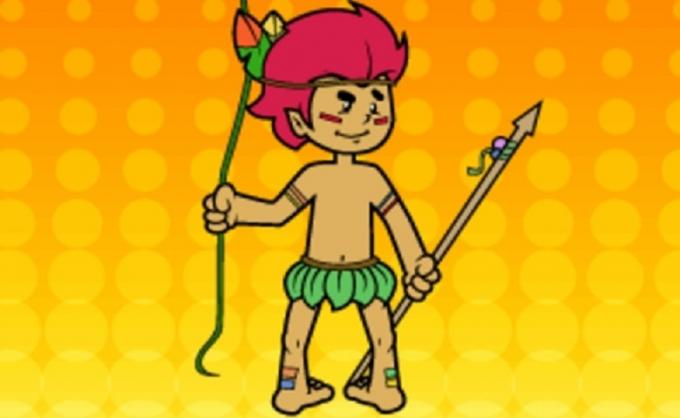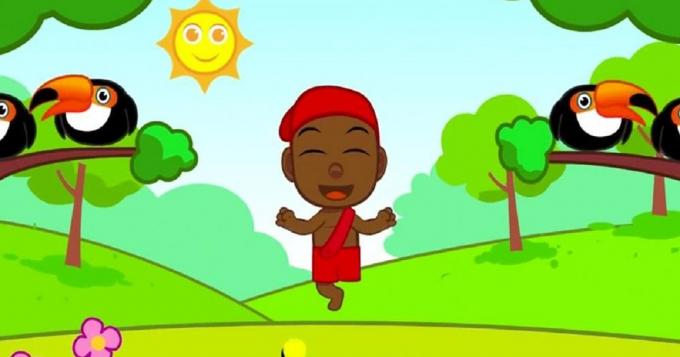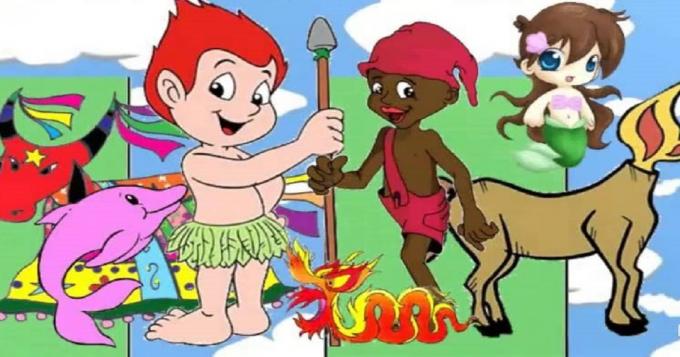Check this post for several ideas and templates ready for your Children's education folklore project and initial series. It is an excellent resource for working the Brazilian Folklore Day.
O Brazilian Folklore Day is celebrated annually on the 22nd of August. (Decree no. 56747 of 08/17/1965).
But what is Folklore? Folklore is a genre of culture of popular origin, constituted by folk customs and traditions handed down from generation to generation.
See too: Folklore Project.
Knowing that Folklore is one of the main factors in identifying a people and its nationality, its work as a pedagogical practice in school units.
Brazilian folklore is very rich and has different manifestations: legends, songs, parlendas, riddles, toys and games, proverbs and popular sayings, crafts, truck bumper phrases, tongue twisters, food and home remedies, beliefs and superstitions, literature, poetry and others, that need to be acquaintances.
Folklore is the means that people have to understand the world. Using their imagination, people try to solve the mysteries of nature and understand the difficulties of life and their own fears.
Knowing the folklore of a country, we can understand its people. And so we started to make part of its history.
Index

Children's Education Folklore Project – Playing with Folklore
Folklore is the way of acting, thinking and feeling of a people or group with the qualities or attributes that are inherent to it, whatever the place where time and culture are located. It's not just the past, the tradition; he is alive and is connected to our lives in a very strong way. That's why it's so important to get to know him.
Folklore knowledge is what we learn informally in the world, through social interaction – orally or by imitation. It is universal, although local or regional adaptations take place as a consequence of collective additions.
a) Personal and Social Formation: socialization, respect, valuing the other, autonomy, initiative.
b) Oral and Written Language: speech, dialogue, argumentation, parlenda, tongue twister, riddles, songs, writing, recipe, reading, legends, informative texts.
c) Nature and Society: history of toys and games, different ways of singing, playing and telling stories.
d) Movement: dancing, playing.
e) Music: songs.
f) Art: dramatization of legends.
g) Mathematics: construction of toys (shapes, colors, measurements, recipes).
The observation of the children's forms of expression, their involvement in activities and satisfaction in their own productions will be an instrument for monitoring the work that will help in the evaluation and re-planning of the action educational.

Children's Education Folklore Project

Early childhood education folklore project at school
Folklore is the strongest expression of the way of life of each social group. So taking into account the importance of cultural manifestations in the life of the population and the need for their preservation, we intend through this Folklore Project early childhood education to promote the integral development of the student, through playful and educational activities, helping them to establish a relationship with the past and the gift.
Relating knowledge, games, legends, characters, songs, toys, poetry, beliefs, proverbs, with the current daily life.
Using the technological resources available at the school, we will help to make this connection, as the continuous change of new technologies influence the way of life, work and social development of students, causing the need to transform teaching processes learning.
Therefore, helping students to recognize this link between the old and the new is fundamental for the construction of the collaborative knowledge, where family, friends, school and community are involved, in which everyone can learn and teach.
Target audience of this children's education folklore project: Kindergarten and Early Grade students, provided that the activities are adapted according to each level of learning.
SPECIFIC OBJECTIVES:
Folklore can be defined as the science that studies all manifestations of popular knowledge, considered indispensable for the social and psychological knowledge of a people. Therefore, activities that aim to rescue popular culture through legends, songs, games, riddles, parlendas, etc. will be proposed. The activities will be developed individually and collectively, and for this it will be proposed:
Folklore is part of the cultural heritage of humanity, as each people has their own way of understanding the facts around them.
Folklore texts are read and spoken by people of all races and religions and they create myths, legends, dances, music, habits and traditions.
Folklore is the set of traditions, popular beliefs, knowledge, legends, songs, proverbs, superstitions, games, poetry, crafts, stories, in short, everything that is part of the culture and memory of a people.
ACTIVITIES


We also recommend these Folk Activities ready to print

Folklore Project Early Childhood Education and Elementary School
General objectives
Specific contents
Specific objectives
Activity schedule
Subscribe to our email list and receive interesting information and updates in your email inbox
Thanks for signing up.